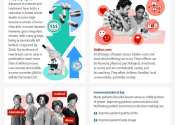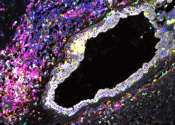Breast cancer (malignant breast neoplasm) is a type of cancer originating from breast tissue, most commonly from the inner lining of milk ducts or the lobules that supply the ducts with milk. Cancers originating from ducts are known as ductal carcinomas; those originating from lobules are known as lobular carcinomas. Breast cancer is a disease of humans and other mammals; while the overwhelming majority of cases in humans are women, men can sometimes also develop breast cancer.
The size, stage, rate of growth, and other characteristics of the tumor determine the kinds of treatment. Treatment may include surgery, drugs (hormonal therapy and chemotherapy), radiation and/or immunotherapy. Surgical removal of the tumor provides the single largest benefit, with surgery alone being capable of producing a cure in many cases. To somewhat increase the likelihood of long-term disease-free survival, several chemotherapy regimens are commonly given in addition to surgery. Most forms of chemotherapy kill cells that are dividing rapidly anywhere in the body, and as a result cause temporary hair loss and digestive disturbances. Radiation is indicated especially after breast conserving surgery and substantially improves local relapse rates and in many circumstances also overall survival. Some breast cancers are sensitive to hormones such as estrogen and/or progesterone, which makes it possible to treat them by blocking the effects of these hormones.
Worldwide, breast cancer comprises 22.9% of all cancers (excluding non-melanoma skin cancers) in women. In 2008, breast cancer caused 458,503 deaths worldwide (13.7% of cancer deaths in women). Breast cancer is more than 100 times more common in women than breast cancer in men, although males tend to have poorer outcomes due to delays in diagnosis.
Prognosis and survival rate varies greatly depending on cancer type, staging and treatment. However, survival rates across the world are generally good. Overall more than 8 out of 10 women (84%) in England that are diagnosed with the disease survive it for at least 5 years.









